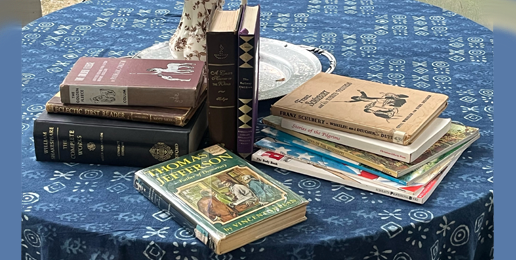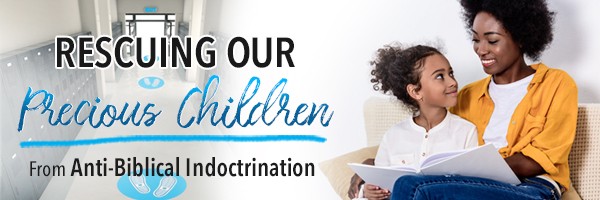
“One more thing is of vital importance; children must have books, living books.
The best is not too good for them; anything less than the best is not good enough.
And if it is needful to exercise economy, let go everything that belongs to soft and
luxurious living before letting go the duty of supplying the books, and the frequent
changes of books, which are necessary for the constant stimulation of the child’s intellectual life.”
~Charlotte Mason~
In Part II, The Art of Nourishing a Child’s Mind, it was established that the mind is capable of dealing with only one kind of food; it lives, grows and is nourished upon ideas and THAT is where we, the educators, can be of most use as we provide a rich cultural, natural and spiritual environment to be the brain food of our children or grandchildren. Also explored was the idea of letting children encounter art and music without needless interference. The same is true when it comes to “serving up” culture in the form of literature for our children.
Cultural Category Continued:
Literature is a unique form of culture in the homeschool. Whereas art and music might fall more into the enrichment category, literature (or books) can form the foundation of much of a student’s education. And while art and music lend themselves more easily to finding those that are worthy, books are another matter. They are, of course, at the heart of any educational environment, but especially the homeschool one. And while one’s mind automatically goes to “textbook” when thinking about schooling, Charlotte Mason had another idea when it came to books suitable for the child’s education. Textbooks, to her, were as dry as sawdust for they often contain endless facts and are written with the single goal of concisely communicating information. We can all relate to the experience of trying to keep our focus as we power through them. Miss Mason herself communicated:
“[The children] will plod on obediently over any of the hundreds of dry-as-dust volumes issued by the publishers under the heading of ‘School Books,’ or of ‘Education.’ Theykeep all such books in the outer court and allow them no access to their minds.”
Why are these school books banished to the outer court of their minds? Because they are dull, lifeless, lacking in what could make them living – ideas! What an unappetizing way to nourish young minds. It can be likened to nourishing their bodies with dry bread and water. We do our best to present food that is not only nourishing but also appealing. The same principle should be applied when nourishing their minds. And Miss Mason’s solution to mind nourishment was ‘living books”:
“A book may be long or short, old or new, easy or hard, written by a great man or a lesser man, and yet be the living book which finds its way to the mind of a young reader”
And that is the key–that the material finds its way into the mind becoming “food for thought,” reflection, and nourishment.
To further define: a living book is one which provides a connection between the reader and the thinking of another person. The end result is that the reader gets in touch with the author’s mind. The Bible is a prime example of this for as each individual reads the “living word of God”, they are put in touch with the mind of God himself.
Living books are often found in those whose authors are sharing not only knowledge about a subject (the facts and nothing but the facts), but also their interest and passion.
To evaluate if a book is a living book apply these questions:
-is it written by one author who has a passion for the subject?
-is it written in narrative form, reading like the author is telling you a story,
OR
-is it conversational in tone, like the author is sitting across the table from you and having a chat?
-is it well-written, not using choppy, twaddly sentences?
-does it touch your emotions and fire your imagination — can you picture what the author is saying in your mind’s eye?
-does it contain ideas, not just dry facts? Are there ideas in it that will feed your mind and heart, shape who you are as a person, and often spark ideas of your own?
While not all of the above criteria must be met, if you find a book that does meet most of it, let the children be the deciding factor. Try it out on them with the “one-page test” as suggested by Karen Andreola in the Charlotte Mason Companion.
“Start reading [the book] aloud to your children and look for signs that it is opening the doors of their minds. Stop at the end of the first or second page. You will know you have found a living book if you hear them plead, “Read me more!”
Those are indeed words sought after by a home educator! A living book has been found! The task for the parent (or educator) then becomes one of finding these books and either reading them aloud to the child(ren) or ensuring there is quiet time and space for them to read to themselves. Again, being mindful of the same approach one takes when exploring art or music–not to serve it up as a lesson, but to offer it up as a feast to be enjoyed!
Even better is to spend time together with all ages feasting on the same book. The benefit of shared books is that each child takes from it what they are able and ready to take. The advantage then to the homeschooling family is one living book can serve to meet the needs of all ages. As with the art and music, there is no right or wrong way to react to the book, no “thing” the child is meant to get, no need to “access” if something was gotten. The child, whatever the age, gleans something via the mind they have been blessed with. They leave the reading of the book with “food for thought” and, unless they are constantly being bombarded with noise (shows streaming incessantly on their devices or rushing about from one planned activity to another), their mind can turn over the ideas and thoughts–they can think. The mind is the instrument of their education. They are learning in Charlotte Mason’s gentle way.
What’s more, the parent has freed themselves up from needing to have all the answers and has paved the way for life-long self-education, and that is a worthy goal indeed!
“The teacher who allows his scholars the freedom of the city of books is at liberty to be their guide, philosopher and friend; and is no longer the mere instrument of forcible intellectual feeding.”
In my next installment, we will explore applying the gentle art of learning in the natural and spiritual categories.




















